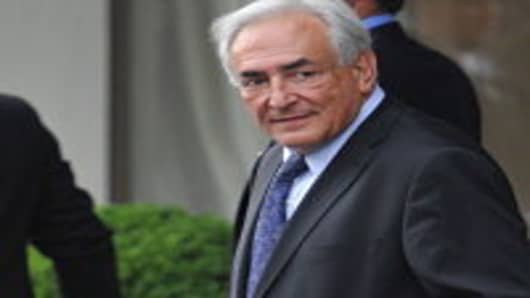As his former colleagues at the International Monetary Fundgather this week, the scandal surrounding Dominique Strauss-Kahn will be a specter in the background.
The political party under whose last spell in power he served as Finance Minister is leading polls against its main opposition, President Nicolas Sarkozy's Union for a Popular Movement. Strauss-Kahn may be pondering the rehabilitation of his reputation, and the possibility of serving in high office in his home country once more.
The former IMF chief's high-profile interview on Sunday refueled speculation that he is not going to quietly retire from politics and spend time with his wife's millions.
With the Socialist Party, of which he is a member, leading polls for next year's elections, is there a chance he could stage a recovery in time for a leading role next year?
Speaking to French TV station TF1, Strauss-Kahn admitted to a “moral failing” over the May incident in New Yorkthat led to him being charged with sexual assault in that city, but added that he could have been the victim of a "plot."
The French are famously—some would say notoriously—more forgiving of sexual misbehavior than the public in the US or UK, but these particular allegations were much more damaging than the mere keeping of a mistress would be.
Michel Taubmann, Strauss-Kahn's biographer, told CNBC.com that the updated version of his book on the French politician, due out in November, will contain more details about potential conspiracy theories. Around a quarter of French people believe that Strauss-Kahn is the victim of a conspiracy, according to polling by OpinionWay.
Still, that leaves a substantial proportion who reject the conspiracy theory.
"This interview was for his supporters, not for those who believe he's guilty," said Taubmann. "While most of those on the right-wing believe he's guilty, there is still a substantial minority of left-wingers who think he's the victim of a conspiracy, and I think those people were comforted by the interview."
Sunday's interview will not have altered French public opinion, as most have already made up their mind about the case, Bruno Jeanbart, director of polling at OpinionWay, told CNBC.com.
"This story was so huge in France, it was talked about in the cafés and on the subways," he said. "People have already decided if they think he's a victim of a conspiracy, or if he got away from justice."
There are currently six candidates to lead the Socialist party in next year's elections, which could mark a return to power for the party after about a decade out of it.
Segolene Royal, the party's candidate against Nicolas Sarkozy in 2007, who is seeking candidacy again, told French radio station RTL it is now time to "turn the page" and "raise the level of political debate."
Her former husband, François Hollande, is tipped as the most likely to win the nomination.
"There's still a small chance for DSK to hold office in France," said Taubmann, who thinks the most likely outcome for Strauss-Kahn is another international job. "People continue to think that he is very competent, and a very good economist, so if the economic situation gets worse, then maybe he can re-establish himself."
France is facing plenty of problems, with questions hanging over the health of some of its biggest banks, and worries about contagion spreading from smaller euro zone economies such as Greece.
Strauss-Kahn, who was succeeded by Christine Lagarde at the IMF, should leave politics entirely for at least two years if he wants to return successfully, Jeanbart believes.
"Even if the Socialists win next May, they won't choose him to be a minister as his personal image has been too damaged by this affair," said Jeanbart. "When French politicians have been damaged (by scandals) in the past, what has been a good strategy is to go far away, then maybe come back."
The outcome of next year's election, which looked like a shoo-in for the Socialists at the start of the year, is now unpredictable, as Sarkozy has since improved his position in the polls.
Of course, the accusations of sexual attack that came from a New York hotel maid in May, which will not now result in a criminal case, are not the only allegations of bad behavior by Strauss-Kahn.
Tristane Banon, the French writer who also has accused Strauss-Kahn of sexual assault, gave an interview to French television station Canal+ Monday in which she repeated her allegations.
"It's a strange story but I don't think on the evidence we know of anything will come of it," said Taubmann. "It's morally not very good for him but I don't think it's a crime."



